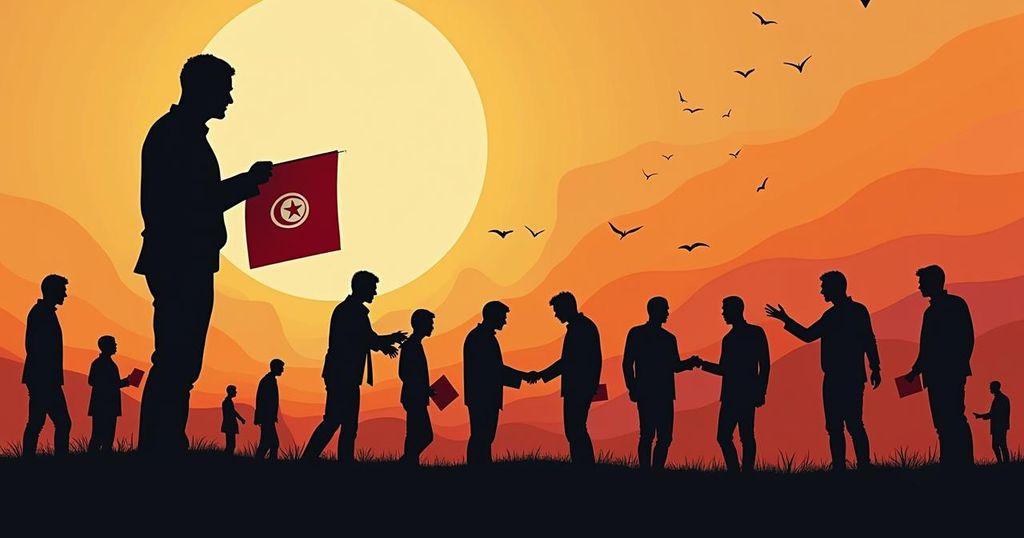Political Repression in Tunisia’s Presidential Election
Tunisia’s presidential election faced abysmally low turnout amid significant political repression, with incumbent President Kais Saied likely to secure re-election as key opponents are either imprisoned or excluded. This election, the third since the Arab Spring, reflects Tunisia’s declining democracy and ongoing economic struggles, including high unemployment and stalled IMF negotiations. Saied’s government faces criticism for its anti-migrant rhetoric and suppression of dissent, while the opposition has called for a boycott of the election process, raising concerns about its legitimacy.
On Sunday, Tunisian citizens participated in a presidential election under challenging circumstances, as political repression significantly diminished voter enthusiasm. The incumbent President, Kais Saied, is poised to secure another term with minimal opposition, having incarcerated key adversaries or excluded them from the electoral process altogether. Saied first assumed office five years ago amid widespread discontent towards the political establishment, which had largely failed to address economic struggles and social unrest. The ongoing election is the third one following the 2011 ousting of President Zine El Abidine Ben Ali, a pivotal moment in the Arab Spring that ignited a wave of revolutions across the region. Tunisia was once celebrated as a beacon of democracy post-Arab Spring, having established a new constitution and won a Nobel Peace Prize for efforts in promoting dialogue. However, political instability combined with economic difficulties persisted, prompting Saied’s election in 2019 on a platform promising a reimagined Tunisia. This election serves as a crucial gauge of public sentiment regarding Tunisia’s declining democratic integrity. Saied, operating without formal party affiliation, managed to retain a loyal base, yet his popularity remains uncertain. The electoral environment has been heavily altered since his controversial power consolidation in July 2021, when he declared a state of emergency—actions that many, including democratic advocates, denounce as a coup. However, participation has seen a downward trend amidst a backdrop of economic hardship and mounting political apathy. The 2023 election only presented three viable candidates—Saied, Zouhair Maghzaoui, and Ayachi Zammel—out of numerous aspirants, as many were disqualified through legal maneuvers that favored the incumbent. High-profile opposition figures have also faced imprisonment, including Rached Ghannouchi of the Ennahda party, which has historically been a significant player in Tunisian politics, thus creating an atmosphere of fear and disillusionment that has led to calls for a boycott of the electoral process by various opposition factions. The country continues to grapple with severe economic challenges, characterized by soaring unemployment rates, rising debt to international lenders, and stalled bailout negotiations with the International Monetary Fund. Saied’s government remains elusive regarding a coherent economic plan, further hindering investor confidence. This economic malaise correlates with increased emigration attempts as individuals seek better opportunities abroad, juxtaposed with a starkly contrasting authoritarian stance towards African migrants. Internationally, Tunisia’s diplomatic relations have evolved, focusing on retaining ties with Western allies while diversifying partnerships with nations such as Iran and China. Saied advocates for national sovereignty, resisting external pressures while establishing agreements with European nations to manage migration flow—a contentious issue that could affect Tunisia’s future relations on the global stage.
The current election in Tunisia, characterized by low turnout and political repression, offers insight into the intricate dynamics of a nation facing significant challenges to its democracy. Following the Arab Spring, which led to the fall of Ben Ali, Tunisia was initially viewed as a success story in democratic consolidation but has since struggled with economic difficulties and political fragmentation. President Saied’s assumption of power during a state of emergency marked a turning point in the political landscape, wherein opposition voices were silenced and electoral processes manipulated. This context is essential for understanding the implications of Saied’s potential re-election amidst broader societal apathy and discontent.
In summary, the presidential election in Tunisia starkly illustrates the ongoing political repression under President Kais Saied, with substantive challenges to democratic principles and societal engagement. The absence of credible opposition and the imprisonment of dissenters paint a dire picture of Tunisia’s political health. As the country grapples with severe economic difficulties and rising political tensions, the implications of this election will resonate beyond its borders, potentially influencing Tunisia’s international relationships and socio-political stability in the future.
Original Source: www.euronews.com




Post Comment